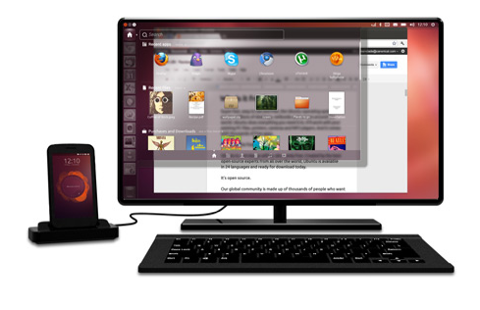Who Would Actually Build an Ubuntu Smartphone?
When Canonical whipped back the curtain from its upcoming Ubuntu for smartphones, it set off a flurry of blogosphere speculation about the open-source operating system’s chances on the open market. At this early stage, Canonical is pushing its mobile Ubuntu platform as capable of powering not only smartphones, but also laptops and desktops—just plug your mobile device into a convenient thin-client dock, and start working on a larger screen. “We expect Ubuntu to be popular in the enterprise market, enabling customers to provision a single secure device for all PC, thin client and phone functions,” Jane Silber, CEO of Canonical, wrote in a Jan. 2 statement. (Canonical works with the open-source community to support Ubuntu worldwide, making its money from consulting services related to the software. Its mobile Ubuntu is separate from Ubuntu for Android.) Despite the attention from the tech media, Canonical faces some sizable challenges if it wants Ubuntu to become a muscular competitor in the mobile arena. For starters, it needs to convince hardware vendors to actually build devices that run the operating system. Those as-yet-hypothetical vendors wouldn’t have an issue with actually building such devices, given the system requirements for an entry-level Ubuntu smartphone: a 1 GHz Cortex A9 processor, between 512 MB and 1 GB of memory, and multi-touch capability. A higher-end Ubuntu “superphone” requires a quad-core A9 or Intel Atom processor, a minimum of 1 GB memory, and both multi-touch and desktop convergence support—again, not a huge issue for any manufacturer. But which company would actually build such a device? Apple and Research In Motion and Nokia are all out of the running, for very obvious reasons. Motorola, as a subsidiary of Google, is also unlikely to leap on the Ubuntu bandwagon. While Hewlett-Packard has flirted with smartphones in the past, most notably after its Palm acquisition, the company doesn’t seem too focused on that segment at the moment. That leaves manufacturers such as HTC, which currently offer devices running either Google Android or Windows Phone. But given Android’s popularity, it might prove difficult for Canonical to convince these manufacturers to do more than release a token Ubuntu device—especially if Google and Microsoft apply counter-pressure. As the Android manufacturer with biggest sales and highest profile, Samsung would have the breathing room to launch an Ubuntu experiment—if it wasn’t already toying with alternate mobile operating systems: Bloomberg is reporting that the manufacturer intends to start selling smartphones based on the open-source Tizen OS. Although the Tizen project resides within the Linux Foundation, Samsung and Intel run Tizen’s all-important Technical Steering Group. (Samsung also manages Bada, another operating system for mobile devices.) “The Tizen was born as Samsung hoped to lighten its growing dependence on Google on concerns that its top position in the smartphone market may weaken following the Google- Motorola tie-up,” Byun Han Joon, an analyst with Seoul-based KB Investment & Securities, told the newswire. “Intel always wanted to boost its presence in the mobile CPU market.” Unless Canonical can enlist significant hardware partners to build top-of-the-line devices, then Ubuntu risks becoming a minor footnote in the history of smartphones. Without widely available devices, customers simply won’t sign on, and developers won’t devote the resources necessary to build apps and other software that every mobile platform needs to survive. Image: Canonical


